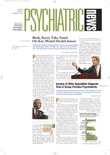When President George W. Bush signed a law in April exempting the National Resident Matching Program from federal antitrust statutes, it signaled the imminent demise of a lawsuit that challenged the match program's legality.
On August 12 Judge Paul Friedman of the U.S. District Court for the District of Columbia agreed with a motion by the Association of American Medical Colleges, Accreditation Council on Graduate Medical Education, and other defendants to dismiss the suit.
Congressional supporters of the match program had inserted language in the Pension Funding Equity Act of 2004 that specifically exempts the resident match program from antitrust laws. (The rest of that legislation concerns how employers determine the interest rate of contributions to their workers' pension plans. It was written in large part to provide relief to several airline and steel companies.)
The law's match-related provisions state that “antitrust laws do not prohibit sponsoring or participating in a graduate medical education residency program, or agreeing to do so.” It does not, however, “exempt from the antitrust laws any agreement on the part of two or more graduate medical education programs to fix the amount of the stipend or other benefits received by students participating in such programs.”
The lawsuit was filed in May 2002 by two residents and an M.D. research fellow who charged that the match program's sponsors conspire to reduce substantially the ability of graduating medical students to compete for slots in residency programs, because the teaching hospitals that participate in the match share salary and other employment-related data. The plaintiffs also alleged that the opportunities to compete for residencies outside the match are negligible, but if they enter the match they are unable to negotiate salaries or working conditions (Psychiatric News, May 21; June 7, 2002).
The AAMC was charged because it operates the match program, and the ACGME was sued because it accredits the residencies that participate in the match and can control the number of slots available in a residency program. The suit also named 27 teaching hospitals as defendants.
The plaintiffs had requested that the suit be granted class-action status so that all physicians who had completed an ACGME-accredited residency or fellowship since May 7, 1998, could be included in the suit. The court had not ruled on the class-action request by the time Friedman granted the defendants' motion to dismiss.
Friedman noted in his ruling that the law took effect as soon as Bush signed it on April 10.
The plaintiffs had argued against dismissal, maintaining that charges regarding a price-fixing conspiracy go beyond the new law's wording about participation in the match program per se and should still be covered by antitrust statutes. The judge pointed out, however, that their complaint did not actually allege a price-fixing conspiracy concerning residents' wages, but rather “a single overarching integrated antitrust conspiracy with the match as its centerpiece.”
APA President Michelle Riba, M.D., a longtime psychiatric educator, told Psychiatric News that the dismissal of the lawsuit is “a significant victory for physicians and medical organizations that realize the critical role the match plays in medical education.”
She added that it would have been “unfortunate” if the plaintiffs had prevailed. “The match has been a major improvement over a time when fourth-year medical students had to devote substantial time and money negotiating in person with individual training directors” whose program interested them.
The decision in Paul Jung, M.D., et al., v. Association of American Medical Colleges is posted online at<www.dcd.uscourts.gov/02-873a.pdf>.
[U.S. District Court for the District of Columbia, Civil Action No. 02-0873] ▪
